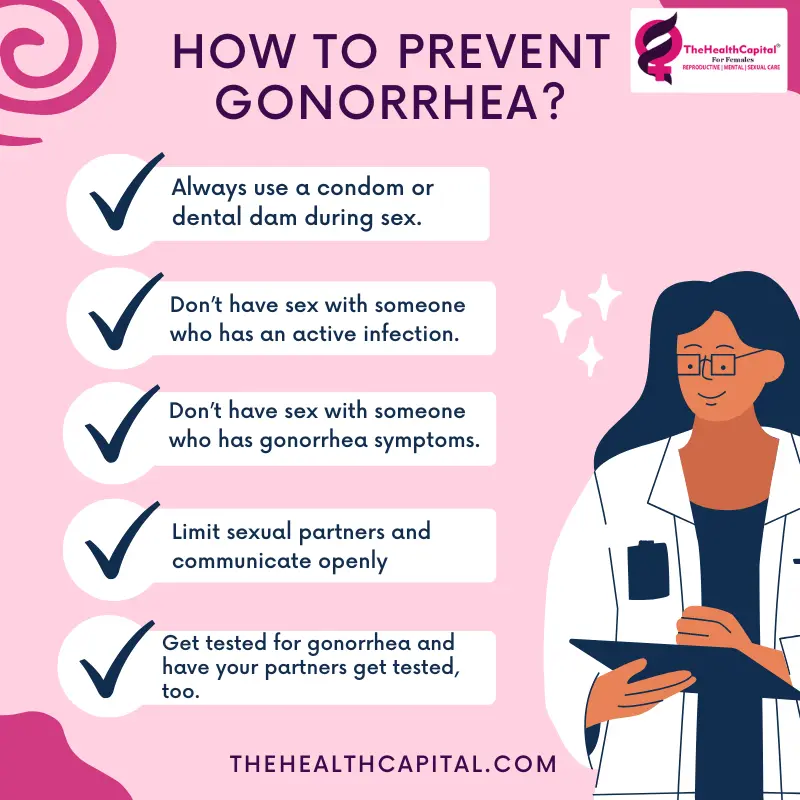“It is no measure of health to be well adjusted to a profoundly sick society.“
-Jiddu Krishnamurti
The clap, often known as gonorrhea, is a sexually transmitted disease (STI). It frequently has no symptoms, especially in those given the gender of a female at birth. Your reproductive system determines the symptoms that are present. If you believe you have an infection, consult a healthcare professional. Antibiotics used quickly can help prevent long-term issues.
The Health Capital brings to you this blog in order to educate the masses about gonorrhea and take precautions accordingly to be safe at all times.
What is Gonorrhea?
A bacterium called Neisseria gonorrhea is the prevalent sexually transmitted infection (STI) known as gonorrhea. Additionally, it goes by the names “the clap” and “drip.” Semen and vaginal fluid are two sexual fluids that can spread the disease. Intercourse, anal sex, oral sex, and sharing sex toys with an infected person are all ways to contract the same.
Gonorrhea symptoms in males or gonorrhea symptoms in females are barely noticed at times. This makes it simple to unintentionally infect your companions. Your risk of infection can be decreased by following your healthcare provider’s advice for regular testing and using safer sex techniques.
Who contracts Gonorrhea?
It can be contracted by sexually active individuals of any age or sex and passed on to partners. When you give birth, you could infect your child.
You’re more likely to contract an infection if you:
- Are under 25.
- Have an STI history.
- Never use dental dams or condoms every time you have intercourse.
- Are engaging in sexual activity with one or more partners who have not had gonorrhea tested
- A man or woman with a penis who engages in sexual activity with other men or women with penises (MSM).
What do Gonorrhea Symptoms look like?
One thing that is particularly true for women and those who were Assigned Female Gender at Birth (AFAB) is that Gonorrhea symptoms are difficult to observe. If you do encounter symptoms, they will probably affect you in different ways depending on which reproductive organs you have.
- Unpleasant urination
- A pus-like discharge coming from the penis’s tip
- One testicle may be painful or swollen
The points mentioned above are for Gonorrhea in Men who have contracted may exhibit the following symptoms.
On the other hand, Gonorrhea in Females may have the following symptoms:
- Increased vulvar leaking
- Unpleasant urination
- Bleeding from the cervix after sex, such as between periods
- Pelvic or abdominal pain
- The illness at different bodily locations
Additionally, gonorrhea can impact the following bodily regions:
- Rectum – Anal irritation, rectal discharge that looks like pus, specks of bright red blood on toilet paper, and needing to strain during bowel movements are all indications and symptoms of this condition.
- Eyes – Eye pain, sensitivity to light, and pus-like discharge from one or both eyes can all be gonorrhea symptoms that affect the eyes.
- Gonorrhea symptoms in Throat – A sore throat and swollen lymph nodes in the neck can be indications of a throat infection.
- Joints – Septic arthritis is an infection of one or more joints caused by bacteria. The affected joints may be warm, red, swollen, and extremely painful, especially when moving.
How widespread is Gonorrhea?
Just behind chlamydia, this illness is the second most typical STI brought on by bacteria. Chlamydia infections and gonorrhea frequently co-occur. Every year, 1.14 million new cases of the same are reported in the US. Most of these infections affect people between the ages of 15 and 24.
What is the cause of Gonorrhea?
Gonorrhea is caused by bacteria entering your body through sexual fluids like vaginal or semen—often during unprotected sex. For the germs to enter your body, they could go through your mouth, vagina, penis, or anus. You don’t have to ejaculate, and neither does your partner, to spread the bacteria. Sharing sex objects that haven’t been cleaned or protected by a new condom increases the risk of the disease.
The most common site of infection in people who are born with the gender assigned is the cervix. The cervix is the opening to your vagina and uterus (womb). In those who were born with the gender assigned to them as male, infection frequently starts in the urethra, the tube via which pee leaves the body.
What is not a cause of Gonorrhea?
Contagious gonorrhea spreads quickly during sexual activity. However, not all bodily fluid exchanges or sexual activities put you at risk for it. This illness cannot be acquired from
- Grasping hands, kissing, or hugging.
- Sharing meals, beverages, and cutlery.
- Using a restroom after another person.
- Catching a cough or sneeze and then inhaling the droplets.
Gonorrhea in Men
Gonorrhea in men will happen if you have sex with someone who is infected. No matter what your gender or sex, this is the same. You can get infected through vaginal contact, anal contact, oral contact, exchanging sex toys that haven’t been disinfected or covered with a condom, and many other sexual activities. You could also be exposed by close genital contact without penetration.
Gonorrhea in Female
Gonorrhea in females can enter the uterus or fallopian tubes and result in pelvic inflammatory illness (PID). Abdominal pain and fever are some of the symptoms in females, which can range from fairly moderate to extremely severe 13. Internal abscesses and persistent pelvic pain can result from PID. PID can also harm the fallopian tubes to the point where it results in infertility or raises the chance of an ectopic pregnancy.
Gonorrhea in a female who is pregnant runs the risk of infecting her unborn child as the child is delivered and travels through the birth canal. This may result in the infant developing blindness, a joint infection, or a potentially fatal blood infection 17. The risk of these consequences can be decreased by treating this disease as soon as it is found in pregnant women.

Exactly how is Gonorrhea identified?
You will be questioned by your healthcare practitioner regarding your symptoms and sexual history. The gonorrhea-causing bacteria will then need to be checked in your urine or other bodily fluids.
In the course of your appointment, your doctor might:
- Perform a pelvic exam while collecting a sample of cervical fluid for analysis.
- Take a sample of your penile fluid for analysis.
- For fluid collection for testing, swab your throat(indication of gonorrhea symptoms in the throat) or rectum.
- Collect a urine sample for analysis.
Your healthcare professional will go over the best test for you and the kind of fluid sample the test needs with you. You might also get a chlamydia test from your doctor. These infections frequently co-occur.
Gonorrhea Treatment
Gonorrhea treatment is necessary for your partner(s). Follow your doctor’s advice regarding when and how to take your medications. Medicines under a doctor’s supervision are necessary for the treatment.
It’s critical to think about what gonorrhea treatment can and cannot do. Your body can get rid of the bacteria with treatment. The effects of the infection on your body prior to therapy cannot be reversed by treatment. After the treatment, it’s critical to protect yourself with preventative measures to avoid reinfection.
Is Gonorrhea Curable?
Yes. This disease can be cured with prompt treatment. Even if your symptoms subside and you begin to feel better, take all medication as directed by your doctor. Additionally, never use another person’s medication to treat your sickness. This makes it more challenging to treat the infection.
It’s crucial to take all medications as directed regardless of the infection, but it makes this even more crucial. Although this disease is currently treatable, antibiotic resistance is growing. “Super gonorrhea” is a term used to describe some types of the same that have become highly resistant to antibiotics.
More than ever, it’s crucial that everyone takes prescriptions as directed and takes precautions against infection in order to maintain the durability of gonorrhea.
How can Gonorrhea be avoided?
Going without sex is the only method to avoid contracting gonorrhea. A more practical objective for many people is to lower their risk of getting and spreading the disease. Take the following actions to lower your risk:
- When having sex, always use a condom or dental dam.
- Don’t engage in sexual activity with someone who is still contagious.
- Never engage in sexual activity with a patient.
- Limit your sexual partners and be honest about your sex life.
- Test yourself for the disease and encourage your partners to do the same.
If you engage in sexual activity, there is no 100% guarantee of gonorrhea protection. For example, condoms can rupture. However, exercising extra care while having sex can significantly lower your chance of infection.

How frequently should I be Gonorrhea tested?
The CDC advises yearly gonorrhea testing for all those who are sexually active, under 25, and designated female at birth. No of your sexual orientation, you might need to get tested every year if you’re thought to be at high risk for the disease. Your age and sexual activity are risk factors. The prevalence of the disease in your neighbourhood and other factors are crucial.
Regarding your risk, discuss how frequently you should get tested with your healthcare professional.
What is the prognosis for those who have Gonorrhea?
- People who receive therapy quickly and diligently adhere to treatment recommendations can go back to their regular life. Numerous long-term health issues might result from untreated gonorrhea. Without proper care, it may possibly be fatal.
- Problems with women
- Gonorrhea can spread to other reproductive organs, such as your uterus and fallopian tubes, and cause pelvic inflammatory disease in people who are born with the gender given to them. PID can lead to infertility and ectopic pregnancies, which can endanger both the mother (the birth parent) and the unborn child’s life.
- Cause blindness in children born to untreated pregnant parents who have eye issues.
- Spread to other bodily organs, causing liver inflammation, damaged heart valves, brain damage, and swollen, painful joints.
Male Complications
- Untreated gonorrhea in those born with a masculine gender preference might result in infertility.
- In the urethra scars.
- Testicular inflammation
- Irritation and soreness in the prostate.
- If it spreads throughout the body, there will be additional issues, such as painful and swollen joints, liver inflammation, damaged heart valves, and brain damage.
Don’t Delay and See Your Doctor Right Away
To conclude, the most crucial thing to keep in mind if you begin to experience any of the aforementioned symptoms is that you and your partner must seek medical attention as soon as possible. If you have previously had sex with your partner, wait to get tested before continuing. Speak to a physician. Most likely, taking medication will be a necessary component of your treatment.
How The Health Capital Is Here For You?
The Health Capital aims to address health-related problems for everyone. It closely examines the issues that people today are dealing with and finds the most appropriate solution. If you notice any complications and think you have contradicted gonorrhea, ensure to take a health analysis test at The Health Capital. Everyone has a right to be aware of every component of her body and is required to have solutions for any issues they may have.
FAQ’s
1. What causes gonorrhea?
Gonorrhea is caused by Neisseria gonorrhea, which is the name of the bacteria. The most frequent way for gonorrhea germs to spread from one person to another is via sexual contact, including oral, anal, or vaginal sex.
2. Is gonorrhea fully treatable?
Yes, gonorrhea can be cured with the proper care. You must take all of the medication prescribed by your doctor in order to treat your infection. Never give anyone else your gonorrhea medication. The infection will be treated with drugs, but the disease's lasting effects will not be reversed.
3. How is gonorrhea transmitted?
Through pregnancy, labour, or nursing, from mother to child, having oral, anal, or vaginal sex without protection.
4. Can you catch gonorrhea?
Rectal thermometers, towels or other fabrics, communal baths, and caretaker hands were all mentioned as possible transmission routes. Gonorrhea can survive for several days in pus on cotton, despite being sensitive to heat and drying.
5. Is gonorrhea a virus or bacteria?
Neisseria gonorrhea, often known as gonococcus, is the bacterium that is the cause of gonorrhea, an STI.

